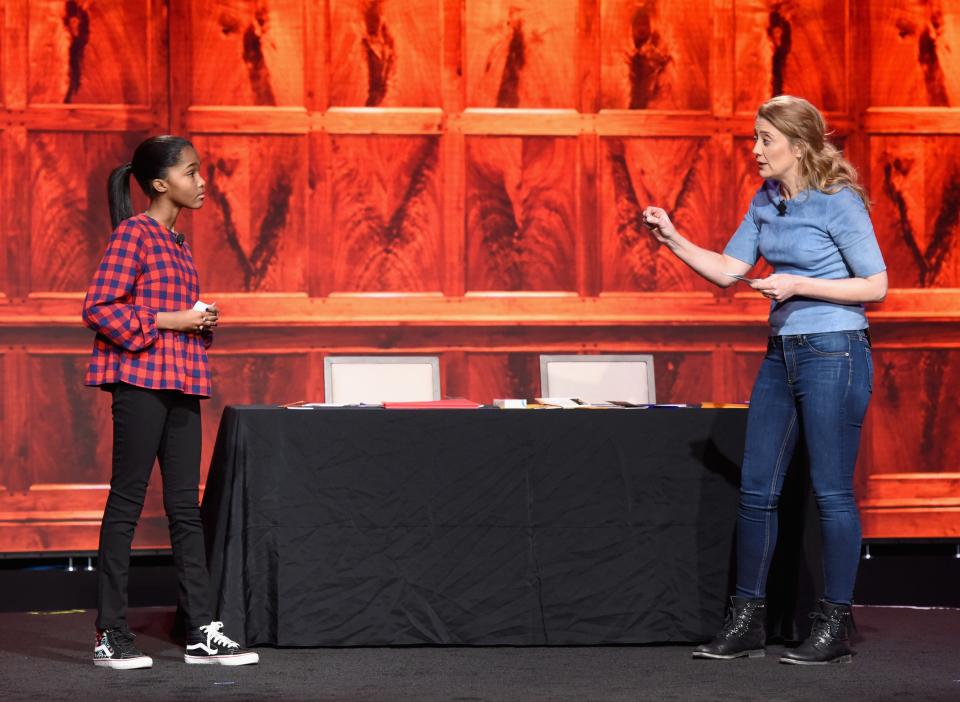Playwright Heidi Schreck On Why Examining the Constitution Is 'Controversial'
Playwright Heidi Schreck is doing groundbreaking work.
Years before her current play was tweeted about by Hillary Clinton and lauded by Gloria Steinem for What the Constitution Means to Me, the playwright and actor took on "sunny characters with something steelier underneath,” as described by The New York Times. She starred in Circle Mirror Transformation, Amazons and their Men, and even The Madrid alongside Edie Falco. But when commissioned by True Love Productions in 2015 to write a play — after 20 years of ruminating on the impact of being a master debater in high school — her life, filled with contentious internal dialogue about the founding pillars of this country, became her most intimate art yet.
“My plays are all about fictional characters,” Heidi, who earnestly chooses her words, tells Teen Vogue. “I hide all my stories in there.”
“I didn't realize how much taboo I had internalized. Even with a mother who taught me to stand up and speak the truth, I was like, ‘Ugh. I don't want to.’ A lot of feelings came up in my body, like, ‘Nobody wants to hear about this. It's shameful. It's indulgent to talk about. It's not interesting.’ And then fear in talking about the abuse in my family, even though I didn't suffer it. Just talking about that felt incredibly scary.”
Writing What the Constitution Means to Me was a bit of an epiphany. All Heidi’s life experiences amalgamated into stage format, critically analyzing a 230-year-old document that affects the very livelihood of every American, yet resides in the recesses of our minds.
If you see the play, which is at The Helen Hayes Theater until Aug 24, it would appear that it was written to address the zeitgeist of a post-Trump nation. Topics like abortion, immigration, xenophobia, and civil rights are all brought up in the form of Heidi traversing these topics as her 15-year-old self. But in actuality, the topics in question — largely touched upon in the 9th, 14th, and 15th amendments — have always been shrouded in incongruences.
"I think when Obama was president, it felt like, 'This is a new hopeful time.' And it was a hopeful time," Heidi says. "But it didn't mean that all those issues were gone. I think what we're now seeing is ugliness laid completely bare with no attempt to act or rectifying it by this government. When I performed the play in 2012, it felt like I was investigating things that we didn't have to talk about as much ... or some of us weren't talking about as much — certainly not privileged white ladies."
Even for lawmakers, the Constitution is a complex script to unpack. Heidi's agenda — in addition to a bit of catharsis from her own generational trauma — is to explore the boundaries of the Constitution, what the United States' forefathers had in mind when writing it, and if it is appropriate for today's world.
“I started studying those cases and then I think that got me thinking about the women in my family,” Heidi says. “And so, the play is structured both as like a deep examination of one tiny section of the Constitution, understanding it as deeply as I could, how it affected my life, and then that leading into [my] family history.”

The 2019 MAKERS Conference - Day One
Asking if the document is even still worthy of existing is part of the play. In the third act Heidi actually debates an opponent on the need for the Constitution: For this, she brought on two actual debate champions, 18-year-old Thursday Williams and 14-year-old Rosdely Ciprian. Arguments are made, the audience becomes the judge, and someone is chosen as a winner at the end of the show.
"People talk about it all the time, saying like, 'This isn't America.' But I think ... it is America,” Heidi says about the current political state of this country. “I think for people of color, this is America. And they've known for a long time.”
"The problem is that there's never been a real reckoning in this country,” she adds. “There have never been reparations. There's never been acknowledgment. The structural inequality is still there and a lot of people still benefit. To reckon with it would mean challenging that and probably mean people who benefit from the racist system might have to give up some things, [they] might have to acknowledge their own racism."
Acknowledging that she knows the power of examining our current legal system, “Somebody's going to lose their privilege in some way," she says. "It’s a very controversial thing.”
Originally Appeared on Teen Vogue

